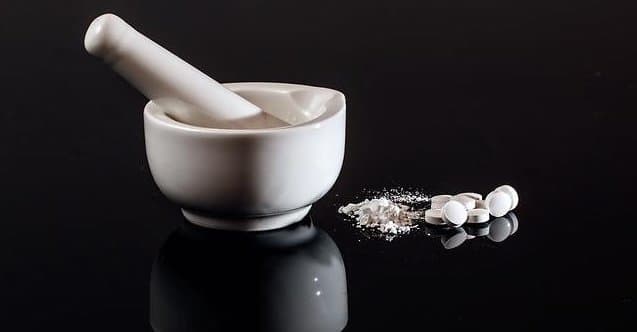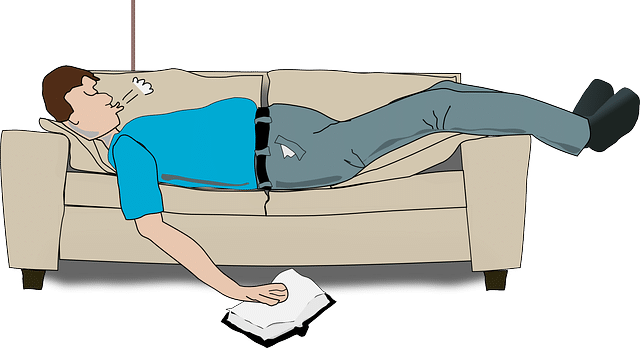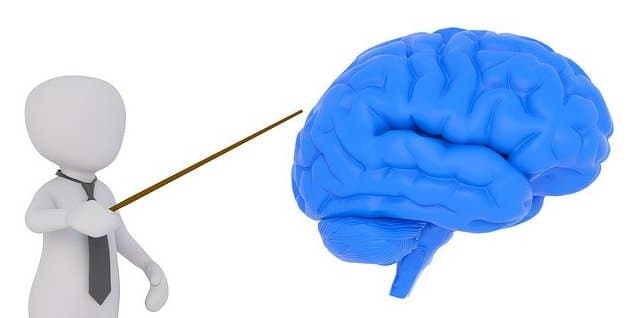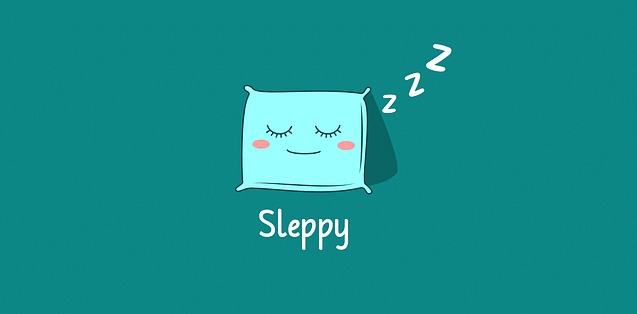Why am I writing about mixing alprazolam (Xanax) and melatonin? Because I’ve done it a few times – and did it last night.
My aim was to research whether the combination is safe and/or more useful in certain ways than each substance used individually.
Xanax (alprazolam) is a benzodiazepine anxiolytic most commonly used for the treatment of acute anxiety episodes.
Melatonin is an endogenous hormone that’s also sold as an exogenous dietary supplement for the modulation of circadian rhythms and enhancement of sleep.
Combining alprazolam with melatonin is not something most doctors would prescribe or recommend – but some people who have alprazolam prescriptions and take melatonin as a sleep aid already do this.
How Xanax (alprazolam) & melatonin work together (Mechanisms of action)
Below are the individual mechanisms of action associated with alprazolam & melatonin, respectively – along with possible synergistic actions.

Alprazolam (Xanax)
GABA-A receptor PAM (positive allosteric modulator).
Binds to GABA-A receptors in such a way that opens chloride ion channels and allows for greater influx of chloride ions within neurons which reduces activation/firing rates (via “hyperpolarization”).
Effects: Amnesic, anxiolytic, hypnotic, myorelaxant, sedative.
Related: Alprazolam (Xanax) for Sleep & Insomnia.
Melatonin
MT1 & MT2 receptor agonist – the same biological targets as endogenously secreted melatonin.
Effects: Chronobiotic, hypnotic, antioxidant, immunomodulatory.
Synergistic effect
Melatonin interacts with melatonin receptors and alprazolam interacts with GABA-A receptors – so there’s not direct overlap in pharmacodynamics (i.e. mechanisms of action).
Emerging evidence suggests that a synergy exists between the melatonergic and GABAergic systems.
Melatonin administration: (1) is associated with significant, dose-dependent increases in GABA concentrations throughout the CNS and (2) modulates GABA-A receptor function. (R)
This considered, co-administration or simultaneous ingestion of alprazolam & melatonin will likely generate a stronger sedative/hypnotic effect relative to using either agent in insolation – particularly if melatonin is administered a circadian-appropriate time (i.e. at night before bed).
Antagonistic actions (?)
Benzodiazepines are associated with episodes of arousal during sleep, hangover effects, and reduced duration of REM & slow-wave sleep (Stage 3 & 4).
It is known that standalone benzodiazepines also decrease the activity of endogenous melatonin – but administration of exogenous melatonin may prevent this from occurring.
Melatonin is understood to improve sleep quality and favorably modify sleep architecture – and may alter sleep differently than alprazolam.
Effects of Xanax & melatonin taken together (combination)

- Anxiolysis (anti-anxiety effect)
- Amnesia (memory loss)
- Drowsiness
- Sedation
- Sleepiness
- Side effects: Headache, restlessness, dizziness, nausea, vomiting.
Note: Certain effects may be more objectively and/or subjectively noticeable as a result of the combination (alprazolam + melatonin) than each substance used independently.
Note: Effects & magnitudes of those effects will likely be contingent upon the individual user and respective dosages of each substance.
Possible dangers & risks of Xanax (alprazolam) & melatonin combination
There are dose-dependent effects for both alprazolam and melatonin.

When co-administered at low and/or standard doses, users will probably notice a synergistic effect yielding more robust anxiolytic (anti-anxiety), sedative, and hypnotic effects than standalone use of either substance.
At high doses and/or supraphysiologic (melatonin) & supratherapeutic (alprazolam) doses, there may be serious consequences/complications for a subset of users – including respiratory depression, coma, and death.
Melatonin may potentiate GABAergic action of alprazolam such that its CNS inhibitory effect is significantly bolstered (perhaps to a greater extent than expected) – and this could prove fatal.
Risk of adverse reactions from alprazolam & melatonin combination depend upon: (1) individual susceptibility (e.g. preexisting medical conditions & health); (2) respective doses administered (alprazolam + melatonin); and (3) systemic presence of other psychoactive drugs.
Risk factors associated with anxiolytic/sedative toxicity include: white race; female sex; alcohol abuse/dependence; cigarette use; illicit drug use; history of IV drug use; psychiatric symptoms. (R)
Does melatonin enhance the GABAergic effect of Xanax to generate more CNS inhibition?

Human studies
Naguib et al. (2007)
In vivo studies suggest that the central anesthetic effects of melatonin are mediated, at least in part, via GABAergic system activation, as they can be blocked or reversed by GABA-A receptor antagonists. (R)
- Accumulating evidence suggests interplay between melatonergic & GABAergic systems.
- Melatonin produces “dose-dependent” increases in GABA levels within the CNS.
- Melatonin may alter GABAergic transmission via modulation of GABA-A receptor function.
Pokharel et al. (2014)
Evaluated the combined effect of alprazolam (0.5 mg) & melatonin (3 mg) relative to each as a standalone in 80 adults.
It was found that the combination: (A) reduced anxiety to a greater extent, (B) but did NOT worsen sedation/amnesia – relative to each used in isolation. (R)
- This suggests that the combination induces a synergistic anxiolytic effect – but NOT synergistic sedation.
- That said, this study utilized low doses of each agent and it remains unclear as to whether increasing the doses might also synergistically increase sedation and CNS depression.
Garfinkel et al. (1999)
Controlled-release melatonin may effectively facilitate discontinuation of benzodiazepine therapy while maintaining good sleep quality.
- Based on this finding, one might surmise that melatonin reverses tolerance to benzodiazepines such that withdrawal symptoms (e.g. rebound insomnia) are diminished.
- If melatonin reverses tolerance to benzodiazepines, then co-administration with alprazolam might potentiate CNS inhibition derived from alprazolam.
Dagan et al. (1997)
A 43-year-old woman taking benzodiazepines for ~11 years attempted to discontinue but experienced severe withdrawal symptoms and rebound insomnia.
Treatment with 1 mg melatonin (controlled-release) enabled complete cessation of benzodiazepines within 2 days – with an improvement in sleep quality and no side effects. (R)
- This case suggests that melatonin may reverse/reduce tolerance to benzodiazepines.
- If this occurs (even in a subset of individuals), then melatonin could strengthen the effect of benzodiazepines via tolerance reversal/reduction.
- Whether melatonin actually lowers tolerance to benzodiazepines remains unclear.
- Limitations of this case report include: low melatonin levels & abnormal melatonin secretion in this specific individual (perhaps due to chronic benzo usage).
Rat studies
Shaji & Kulkarni (1998)
High-dose melatonin (10 mg/kg & 20 mg/kg) potentiated the hypnotic effects of pentobarbital (45 mg/kg) in rats. (Pentobarbital = a barbiturate that functions analogously to alprazolam via GABA-A receptor modulation). (R)
Atsmon et al. (1996)
Research in rats found that: (1) benzodiazepines can suppress melatonin levels & (2) melatonin can increase brain benzodiazepine binding.
Benzodiazepine + melatonin combination reverses/prevents benzo-mediated suppression of melatonin binding. (R)
- Both of the above studies support the idea that melatonin potentiates the actions of substances that induce CNS inhibition via modulation of GABA-A receptors (analogous to how alprazolam functions).
- This indicates that, in theory, melatonin might have similar capability in humans such that it could enhance the effect of alprazolam.
- Obviously these studies are limited by the fact that they: didn’t specifically use alprazolam; involved rats (non-humans); and used very high doses of these substances.
High-dose alprazolam (Xanax) & high-dose melatonin
It is known that standalone high-dose alprazolam can be fatal.
Some evidence suggests that alprazolam is “relatively more toxic than other benzodiazepines” in overdose. (R)
Knowing this, it’s logical to think that: if melatonin potentiates alprazolam’s action – then it could further increase risk of fatality (particularly among high-dose users).
Melatonin in isolation is relatively benign, even from overdose (zero documented deaths in adults).
Melatonin & CNS depressants (Case reports)
That said, there are “case reports” in which combinations of CNS depressants & high-dose melatonin caused adverse events like severe hypotension.

Case #1
An adolescent took 180 mg melatonin (with fluoxetine 40 mg, hydroxyzine 50 mg, guanfacine 4 mg) and developed “severe hypotension” (standing: 50/21 mmHg). (R)
- It should be noted that the hypotension probably wouldn’t have occurred with standalone melatonin – the combination of these medications (which included melatonin) likely produced this effect.
- It is unclear as to what specific role melatonin may have played (or whether it played any role at all) in causing the “severe hypotension” (given that guanfacine directly lowers blood pressure & hydroxyzine can lower blood pressure).
- It also warrants mentioning that this individual “overdosed” and was not using medications & supplements as intended/directed – so the effect may be irrelevant to individuals who administer low or standard (i.e. conventionally-recommended) doses.
Case #2
A 66-year-old man took 24 mg melatonin with chlordiazepoxide (a benzodiazepine) & amitriptyline (tricyclic antidepressant) and experienced: disorientation, amnesia, and anxiety – his spouse claimed he appeared “drugged.” (R)
- This individual increased his nightly melatonin dosage from a usual dosage of 6 mg – to 24 mg in hopes that it would help him cope with anxiety the night before prostate surgery.
- Within 20 minutes of administering melatonin, the individual felt lethargic, disoriented, became alarmed and called the local poison center – complaining that he felt unusually fatigued and sleepy.
- Hours later he developed amnesia – and was unable to remember events of the previous evening.
- He was monitored by his spouse (who communicated with medical professionals at the poison control center) and his surgery went ahead as planned without complications.
- This individual recovered from the atypical changes in mental status associated with higher-dosed melatonin (24 mg) within 48 hours.
- When asked why he takes melatonin with chlordiazepoxide and amitriptyline – the individual claimed that it potentiated the sedative medication and made it more effective for chronic insomnia.
- It was further noted that this individual was also using lisinopril (lowers blood pressure) and diltiazem (calcium channel blocker – can lower blood pressure); it’s unclear as to whether appreciable concentrations of these medications were in circulation at the time the other drugs were administered.
- Because the patient took 24 mg melatonin (instead of his usual 6 mg) – and didn’t change doses of his other medications, authors of the case report suggest that melatonin may have been the cause of his alarming symptoms.
These cases demonstrate that combining high doses of melatonin with other CNS depressants (e.g. benzos) might increase risk of adverse events via potentiation of CNS inhibition.
Note: The LD50 for alprazolam ranges from 331 mg/kg to 2171 mg/kg in rats. In theory this would mean that individuals would need to take several thousand times the maximum dose to fatally overdose.
Note: Melatonin has no LD50 – but might lower the LD50 threshold for alprazolam. It’s also possible – albeit less likely – that melatonin could somehow raise the LD50 for alprazolam – making fatality less likely with combined use than isolated alprazolam use.
Alprazolam & Melatonin (Combination) (Research)
There is ONE study that I found in which alprazolam was taken with melatonin as a combination.

Premedication with Oral Alprazolam and Melatonin Combination: A Comparison with Either Alone – A Randomized Controlled Factorial Trial (R)
Authors: Pokharel et al. (2014)
Aim: Determine whether adding melatonin (3 mg) to alprazolam (0.5 mg) would have superior premedication effects relative to either drug alone – in 80 adult patients.
Design: Prospective, double-blind, placebo-controlled, randomized.
Measures: Change in anxiety & sedation score after premedication (15, 30, 60 minute intervals); number of patients with memory loss for 5 pictures shown at various time points.
What were the results?
No difference in sedation: Sedation scores at various time points did not differ significantly between combination (melatonin + alprazolam) and alprazolam in isolation.
Superior anxiety reduction: Adding melatonin to alprazolam generated a superior anxiolytic effect relative to: standalone melatonin, standalone alprazolam, and placebo.
No difference in memory: Number of patients not recognizing pictures shown 60 minutes after premedication did not differ significantly between combination (melatonin + alprazolam) and alprazolam in isolation.
- The combination (alprazolam + melatonin) caused significantly greater memory impairment relative to placebo for one event – but it did not cause significantly greater memory impairment than standalone alprazolam.
- There was a trend for greater memory impairment (i.e. amnesia) among those receiving the combination (melatonin + alprazolam) relative to standalone alprazolam based on the fact that amnesia for 2 events was notable in the maximum number of patients receiving the combination.
No difference in side effects & safety: There was no significant difference between groups in the number of people reporting nausea, vomiting, dizziness, headache, or restlessness. The combination was safe in terms of side effects observed until 24-hours after surgery.
Benefits of alprazolam & melatonin combination (Potential)
- Synergistic anxiolytic effect: Research found that the combination of alprazolam (0.5 mg) and melatonin (3 mg) generates a stronger anxiolytic effect than either agent used in isolation.
- Higher-quality sleep (?): Some individuals report getting much higher quality sleep (subjectively) with the alprazolam-melatonin combination – than when using either alprazolam OR melatonin to enhance sleep.
- Insomnia relief (?): Some individuals may not get adequate insomnia relief from melatonin or alprazolam used separately. The combination might prove effective for induction and/or maintenance of sleep in some cases.
- Generally safe if used responsibly: If used responsibly (at appropriate doses) under the supervision/guidance of a medical doctor – this combination is relatively safe. In a study of 80 adults, side effects from this combination were no worse than each used in isolation.
- Lower dosages than usual (?): Because alprazolam and melatonin are likely synergistic via actions within GABAergic systems (increasing GABA & modulating GABA-A receptors) – lower than usual doses of alprazolam and melatonin might be needed than when using each agent separately. (This could be perceived as an advantage because less alprazolam is used.)
- Tolerance reversal/reduction (?): Researchers suspect that melatonin might reverse/reduce aspects of benzodiazepine tolerance. In some cases (among those with a high tolerance), co-administration of melatonin might make alprazolam more effective without dosage adjustment.
Drawbacks of alprazolam & melatonin combination (Potential)
- Adverse events: Certain adverse events may become more likely and/or more severe with the combined administration of alprazolam and melatonin. This could be due to synergistic CNS inhibition resulting from co-administration.
- Contraindications: Medical contraindications may increase with administration of alprazolam and melatonin.
- Respiratory depression & death risk (?): It’s possible that combining alprazolam and melatonin might increase risk of respiratory depression and death in some cases (e.g. at high doses) – due to the fact that melatonin may potentiate the action of alprazolam.
- Neuropsychiatric reactions: Combining alprazolam and melatonin may increase the risk of experiencing neuropsychiatric reactions – particularly among those with preexisting neuropsychiatric conditions.
- Next-day (residual) effects
- Brain fog & cognitive impairment: Unclear thinking, inability to focus, memory problems, etc. may be more prevalent and/or long-lasting. (Read: Alprazolam & Cognition).
- Fatigue, lethargy, grogginess: Low energy and difficulty maintaining alertness may be more common with the combined use of these substances.
- Psychomotor impairment: Degree of psychomotor impairment may be worsened from alprazolam with melatonin. (Users should not operate heavy machinery until the effects fully wear off.)
- Worse than each in isolation (?): Some individuals may find that combining alprazolam with melatonin is less effective than using one agent in isolation.
Note: This article is written assuming this combination is used infrequently and not regularly/chronically. Regular chronic use of alprazolam may cause addiction, dependence, long-term complications, tolerance onset, rebound insomnia and withdrawal upon cessation.
Alprazolam & Melatonin Interactions (Drugs.com)
According to Drugs.com interaction checker: “alprazolam” and “melatonin” have a moderate interaction.

- CNS & respiratory depressant effects may be synergistic (additive) – particularly in elderly or debilitated patients.
- Sedation and impairment of attention, judgment, thinking, and psychomotor skills may increase when using this combination.
Recommendation: Using alprazolam and melatonin at the same time should be done with caution and under the supervision/guidance of a medical doctor.
Why? It’s possible that this cocktail could induce excessive CNS & respiratory depression.
Ambulatory patients should be counseled to avoid hazardous activities requiring mental alertness and motor coordination until they know how these agents affect them.
Emergency medical care should be sought if the combination produces excessive or prolonged CNS effects that interfere with normal activities or general health.
Note: Interaction risks associated with mixing alprazolam with melatonin are likely highest when: (1) dosages of each substance are high; (2) preexisting medical conditions are present; and (3) additional substances are used with these 2 agents.
What do medical doctors/professionals think about mixing alprazolam & melatonin?
Dr. Rajasekhar (Psychiatrist)
“Both Xanax and melatonin are sleep inducing drugs. So if you take both of them you will be experiencing excessive sedation and next day drowsiness. As such there is no contraindication to use both of them together, but better to avoid. While taking alprazolam which is a benzodiazepine drug, whose main indication is to induce sleep, it is better to avoid other drugs which are sleep inducing and drugs which have a propensity to cause sedation.”
This psychiatrist states that although there is no contraindication to take alprazolam with melatonin – it’s not recommended due to the fact that it might cause excessive sedation/drowsiness the next day.
This psychiatrist is incorrect in stating that the main indication of alprazolam is to induce sleep (although perhaps it is used this way in his location of practice.)
Adekunle Onifade (BSc in Pharmaceutical Science)
“I wouldn’t advise it because both are hypnotics. Although melatonin would help facilitate alprazolam withdrawal while maintaining a good night’s sleep.”
It is unclear what this individual’s exact qualifications are, but they have a degree in pharmaceutical science and do NOT recommend the combination.
Note: This is a small sample of answers. If you want to know whether alprazolam and melatonin combination is safe for you – consult a medical doctor.
Variables that influence reaction to Alprazolam & Melatonin (Combination)
Dosage of each
The respective dosages of alprazolam and melatonin administered will likely have the most significant influence over the objective/subjective effects experienced while using this combination.
Formats of each
The respective formats of alprazolam and melatonin may also impact the objective/subjective effects experienced while under the influence of this combination.
- Immediate-release: Both alprazolam and melatonin have “immediate-release” formats. Alprazolam IR lasts ~4-6 hours and melatonin IR lasts ~4-8 hours. Immediate release formats may deliver a much stronger effect upfront – followed by a quicker fade.
- Extended/sustained-release: Both alprazolam and melatonin have “extended/sustained-release” formats. Alprazolam XR lasts ~11 hours and melatonin SR lasts ~6 hours. Extended-release formats will deliver a longer-lasting effect perhaps with a more gradual onset and fade.
Systemic presence of other substances
This includes anything you consumed throughout the day that may be circulating in your system such as: caffeine, nicotine, alcohol, cannabis, dietary supplements, pharmaceutical medications, over-the-counter medications, etc.
Any ingested substance with psychoactive effects could potentiate or attenuate the combination of alprazolam and melatonin – and may increase risk of interaction effects.
Medical conditions
Preexisting medical conditions (e.g. pulmonary disease, psychiatric conditions, etc.) may increase risk of adverse reactions to the combination of alprazolam and melatonin.
Time of respective administrations
- Administration timing: Time of day at which these substances are administered matters – particularly for melatonin. Suboptimal administration timing for melatonin could dysregulate the circadian rhythm and cause its own set of side effects.
- Taken together: Administering alprazolam and melatonin at the same time will increase likelihood of a synergistic effect.
- Taken apart (how far apart?): The longer the time gap between taking alprazolam and melatonin – the shorter the duration of simultaneous action will be.
Circadian rhythm
Circadian dysregulation and/or administering melatonin at a circadian-inappropriate time (e.g. during the day) may reduce the effect of melatonin and thus the combination (to some extent).
Administering melatonin at a favorable time relative to circadian rhythm should optimize its effect.
Individuality
Individuals may respond atypically or paradoxically to both alprazolam and/or melatonin.
Atypical reactions may be due to genetic/epigenetic factors, neurochemistry, general health, as well as the specific dosages of each substance that’s administered.
Note: This is assuming you do NOT have tolerance or partial tolerance to alprazolam.
- If you regularly ingest GABA modulators (including alcohol) you may have partial tolerance to alprazolam via “cross tolerance.”
Note: This assumes that the “alprazolam” and “melatonin” you’re using are pure and do not contain other psychoactive components.
- Many melatonin products contain psychoactive substances like 5-HTP, L-theanine, etc. – and sometimes they aren’t even listed on the product’s ingredients.
My experience: Taking alprazolam & melatonin together…

Last night I fell asleep quickly after taking 9 mg sustained-release melatonin (releases melatonin evenly over a 6-hour term).
However, I woke up after about 4 hours, unable to fall back asleep despite doing a relaxing meditation.
Although I probably could’ve fallen back asleep with continued effort, I took the easy way out and popped an alprazolam (0.25 mg).
The alprazolam kicked in fairly quickly and I was back asleep within 30-40 minutes.
Technically I did NOT administer both at the “same time” last night.
The sustained-release melatonin was in its final 2-hour window of action and alprazolam was just taking effect. So what happened?
I fell back asleep, had some weird dreams (was asleep for ~1.4 hours), woke up for a few minutes (likely due to the weird dreams), fell back asleep again for ~2.5 hours.
After waking up, I felt extremely groggy, lethargic, and unfocused (severe brain fog/mental haziness).
My cognitive abilities and productivity took a massive hit until about 5 PM (the effects eventually diminished).
Summary of effects that I experienced…
- Significant relaxation (zero anxiety)
- Brain fog & cognitive impairment
- Fatigue & lethargy
- Grogginess & sedation
- Urge to sleep more (it was already late so I fought it and got up)
- Weird dreams (I experience these with melatonin & alprazolam individually – so it’s unclear as to whether the combination caused more weird dreams than I would’ve had with standalone melatonin)
- Cooler body temperature (melatonin seems to reduce core body temperature, and for me it’s noticeable… alprazolam also does when I’m having difficulty falling back asleep)
I cannot be certain that all of these effects are attributable to the combination of alprazolam & melatonin.
Some of the effects might simply be due to poor overall sleep quality (which can cause nearly every effect listed).
On a different occasion I’d taken high-dose melatonin (20 mg) with low-dose alprazolam (<0.125 mg) – as part of a cocktail with low-dose diphenhydramine (<12.5 mg), low-dose clonidine, and some other sedative agents (confirmed to be safe in combination).
In this “different occasion” I was in a state of very high anxiety – and was dealing with debilitating insomnia such that I needed a multifaceted pharmacological nudge to get some sleep.
Anyways, I recall experiencing profound relaxation but also uncomfortable disorientation and perhaps mild transient depersonalization.
Do I enjoy taking alprazolam & melatonin more than either alone?
No. In fact I try to avoid using alprazolam entirely unless my “sleep maintenance” insomnia (i.e. middle insomnia) randomly flares up.
I generally sleep best with either melatonin OR zero supplementation. Furthermore, I never have an issue falling asleep.
My only issue has ever been staying asleep throughout the night or waking up and being unable to fall back asleep. (And no I don’t have sleep apnea.) (Read: Insomnia After Covid).
The main reason I dislike this combination (unless absolutely necessary) is because it causes significant brain fog, cognitive impairment, and sedation/fatigue that linger for the entire next day (or at least half the day) – and these are more debilitating than using melatonin OR alprazolam in isolation.
However, in a study that tested the combination (alprazolam + melatonin) vs. alprazolam vs. melatonin vs. placebo – most patients expressed desire to get a similar premedication in the future. (R)
Is it safe to take alprazolam with melatonin?
Ask your doctor. Safety of these substances will depend on both the: (1) specific user (health, medical conditions, genetics); (2) respective dosages of each; and (3) timing of melatonin administration (relative to circadian rhythm).
- Contraindications (medical conditions)
- Interactions (other substances used)
In persons who are healthy who use alprazolam and melatonin at responsible doses, risk of adverse events is likely low.
Does alprazolam interact with melatonin?
Not really. There’s no evidence that alprazolam interacts with melatonin pharmacodynamically (via neurochemical actions) because the former modulates GABA-A receptors and the latter agonizes melatonin receptors.
Co-administration of alprazolam and melatonin might generate a synergistic effect – characterized by alterations in neurotransmission that do not occur with each substance administered individually.
Specifically, it is thought that melatonergic (target of melatonin) and GABAergic systems (target of alprazolam) interact wherein melatonin increases: (A) GABA concentrations and (B) modulation of GABA-A receptors – perhaps due to greater GABA binding.
In this sense, it’s possible that the combination (alprazolam + melatonin) would increase overall inhibitory tone in the CNS & PNS – such as to increase anxiolysis and sedation.
I suspect that melatonin: (1) reduces certain stress-related neurotransmitters/neuropathways that may be distinct from those affected by alprazolam and (2) has a modest CNS inhibitory effect of its own – such that when alprazolam is co-administered, it’s effect is strengthened due to further reduction of “excitatory tone.”
This synergism is supported by preliminary research which found a significantly stronger anxiolytic effect from melatonin (3 mg) + alprazolam (0.5 mg) combined vs. each used individually and vs. a placebo.
There’s also no evidence that alprazolam interacts with melatonin pharmacokinetically – as each is metabolized by different enzymes (CYP3A4 & CYP1A2).
Have you ever taken alprazolam and melatonin together?
- Reason for doing this (rationale)
- Respective dosages
- Subjective effects (side effects, adverse events, etc.)
- Preexisting conditions and/or other substances ingested?
- Time of administration?
- Effect on sleep (duration, dreams, etc.)
- Next-day effects (residual effects)?
- How often do you use this combination? Is your doctor aware of it?